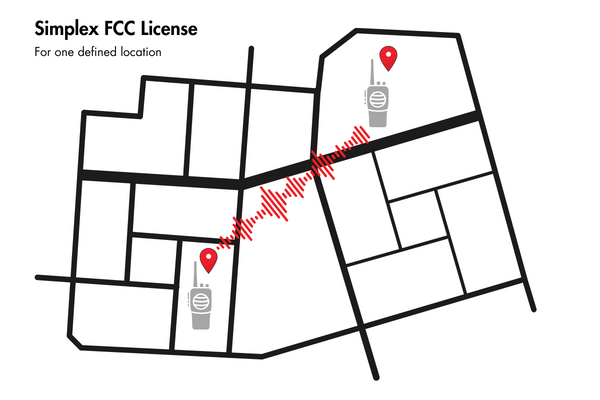When it comes to two-way radios for personal or business use, understanding the options available for FCC licensing is crucial. Two common types of FCC licensing are "simplex" and "itinerant," both for different uses. Let’s talk about the differences between each license to help you determine which is right for you.
FCC Industrial/Business Pool
The Federal Communications Commission (FCC) Industrial/Business Pool frequencies (also known as the business band), are a set of frequencies on UHF and VHF that are reserved for companies and individuals. An applicant can apply for business pool frequencies in which they are eligible for.
Per the FCC, eligibility includes persons engaged in:
- Operation of a commercial activity
- Operation of educational, philanthropic, or ecclesiastical institutions
- Clergy activities
- The operation of hospitals, clinics, or medial associations
These frequencies will require you to obtain a license from the FCC. There are two types of license that you can apply for: Simplex and Itinerant (and repeater/base station license if needed).
Simplex License
A simplex license is for businesses who are using radios at one defined location or within 50-mile radius of that defined location. This type of license is good for construction sites, industrial and manufacturing plants, schools, event venues, and more.
Simplex licenses will require a frequency coordinator. Frequency coordinators are private organizations certified by the FCC to find you one or more appropriate frequencies that are not currently being used in that area. To find a frequency coordinator, the FCC has listed several organizations here.
While there is always a risk of interference, with the help of frequency coordinators, interference is low because you’re operating on frequencies that aren’t being used.
Because you need to hire a frequency coordinator, the cost for a simplex pool license can cost upwards of a few hundred dollars. A plus side to this is they will file the FCC paperwork for you, saving you the headache.
Pro: Low Interference
Con: Frequency Coordinator cost

Itinerant License
Itinerant licenses are for businesses who intend to use radios at many locations rather than at a single location. An itinerant license allows you to have a shared frequency across a wider range of operation. Many radios are programmed with itinerant frequencies. These frequencies are common, so frequency exclusivity is not guaranteed which means you can experience interference.
Unlike a simplex license, itinerant licenses do not require a frequency coordinator, saving you time and money. Although you won’t need a frequency coordinator, the licensing process for itinerant licenses isn’t known to be the most user friendly and timely. Because of this, many two-way radio companies offer FCC licensing services that will apply for you. Companies such as buytwowayradios.com, bridgecomsystems.com, and firstsourcewireless.com, can apply your business for an FCC license for a small fee.
An itinerant license is good for businesses working on multiple job sites in various places. Itinerant licenses can be used statewide, in multiple states, nationwide.
Pro: Does not require a frequency coordinator (saves you money).
Con: Risk of interference is high

Repeater / Base Station Frequency License
Fixed base stations and repeaters require a Repeater / Base Station Frequency License. Many two-way radio users want to use repeaters to get better coverage, penetration, and a longer range. For example, a large farm wanting to extend their radio coverage by building out a repeater. A repeater receives radio signal from one frequency and transmits the same signal on a different frequency.
Is Licensing Difficult?
If you require a frequency coordinator, the license is normally filed through them with the FCC which saves you the hassle. While licensing with the FCC is not as difficult as it may seem, it can be a lengthy process and intimidating for first time applicants. It does take a bit of knowledge to have it done correctly. You can file your application through the Universal Licensing System (ULS).
How First Source Wireless Can Help
If you’re not wanting to file the form yourself, we at First Source Wireless are happy to help you. By allowing us to file your FCC license, we make the process pain free and simple. We have experience in helping organizations file FCC Licenses. For more information, visit our FCC Licensing Services page for more details.

